Your Guide to Purchasing Plastic Flower Pots
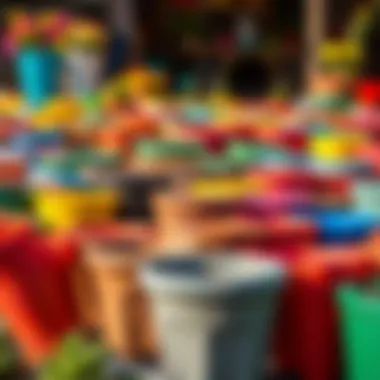
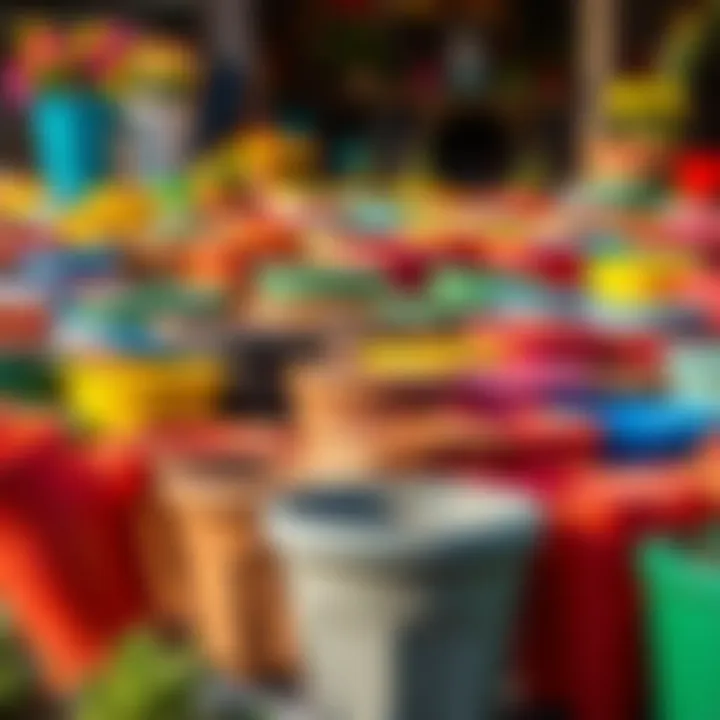
Intro
When it comes to nurturing plants, whether you’re cultivating a few herbs on your windowsill or managing a vast garden, the right equipment can make all the difference. Among the essentials, plastic flower pots stand out for their versatility, affordability, and range of sizes and styles. But with an abundance of choices available, how do you navigate this sea of options? From local garden centers buzzing with gardeners to online marketplaces offering doorstep delivery, the avenues for acquiring plastic flower pots are plentiful. In this guide, we’ll journey through the best places to procure these pots, discussing factors like quality, price, and the credibility of vendors.
Latest Trends in Agriculture
Overview of Current Trends
The landscape of agriculture is shifting, and so is the way gardeners think about the tools they use. More than ever, there’s a growing focus on efficiency and sustainability. This isn’t just a passing fad; it reflects a deeper understanding of environmental stewardship. Plastic flower pots, in particular, are moving into the spotlight. With recycling initiatives and a push for biodegradable options, many gardeners are considering the life cycle of their planting materials when deciding what to buy.
Impact of Technology on Farming Practices
Technology is also changing the face of gardening. Tools like smart sensors and automated irrigation systems come to mind. However, even basic items like plastic pots are benefiting from advancements in design and materials. For example, pots that promote better drainage and air circulation are becoming increasingly popular. These innovations provide significant advantages for plant growth and health, leading to happier gardeners and more fruitful harvests.
Sustainable Practices: Towards a Greener Future
Importance of Sustainability in Agriculture
Sustainability is not just a buzzword; it’s a necessity for the future of gardening. As enthusiasts become more aware of their impact on the environment, they seek out products that align with their values. Plastic flower pots that are made from recycled materials or are themselves recyclable help mitigate waste. Choosing suppliers who are committed to eco-friendly practices also supports the broader agricultural community.
Methods for Sustainable Farming
- Composting: Using kitchen scraps or yard waste helps reduce landfill burden while providing nutrients for plants.
- Rainwater Harvesting: Collecting rainwater reduces reliance on municipal water sources.
- Crop Rotation and Diversity: This practice prevents soil depletion and fosters biodiversity, something even container gardeners can embrace.
By integrating these methods into their routines, gardeners can establish a more sustainable setup, benefiting both plants and the planet.
Gardening Techniques and Tips
Essential Gardening Tools and Equipment
While plastic flower pots are a key component, several other tools are invaluable for successful gardening. Consider adding the following to your toolkit:
- Quality Trowel: This is crucial for potting and transplanting.
- Watering Can with a Long Spout: Ideal for reaching into tight spots.
- Soil Testing Kits: Understanding your soil can dictate what nutrients to add.
Seasonal Gardening Practices
It’s important to recognize that gardening is not static; it evolves with the seasons. Here are some practices to keep in mind:
- Spring: This is prime time for planting. Ensure your flower pots are clean and ready for new seeds.
- Summer: Pay attention to moisture levels; plastic pots can hold heat, affecting root health.
- Fall: Time for harvesting and preparing for winter. Consider lightweight pots for easy relocation indoors.
These tips not only improve your gardening skills but also enhance overall plant health.
Culmination
Navigating the world of plastic flower pots requires a keen eye and thoughtful choices. Whether opting for local shops or diving into the online marketplace, being informed about trends, sustainability, and gardening practices helps ensure you make purchases that support both your garden and the environment. Armed with the insights from this guide, you’re well on your way to selecting containers that not only meet your needs but also elevate your gardening experience.
Prologue to Plastic Flower Pots
When embarking on the journey of gardening, especially for those who are just beginning, the choice of flower pots is not just a trivial matter. The importance of plastic flower pots extends far beyond mere aesthetics. These vessels play a crucial role in the growth and sustainability of your plants, regardless of whether you’re nurturing a few houseplants or maintaining a full-fledged garden.
First and foremost, plastic flower pots are known for their durability. Unlike terracotta or ceramic, plastic pots are less likely to break if dropped or knocked over. This factor alone can be a game-changer for novice gardeners, who are often still learning the ropes of caring for their plants. Moreover, plastic is lightweight, making it easier for gardeners to rearrange their plants or move them outdoors as the weather permits.
Another significant aspect of plastic pots is their affordability. Compared to other materials, they often come with a lower price tag which is a boon for anyone on a budget or for those wanting to experiment with numerous pots without breaking the bank. And let’s not forget the wide variety of shapes, sizes, and colors that plastic pots offer. This means you can customize your gardening space easily, adding a splash of color and design that complements your home environment.
However, one should also consider the importance of aeration and drainage when selecting plastic flower pots. It’s essential to choose pots that have adequate drain holes to prevent root rot. Understanding this prevents the disappointment of losing a favorite plant due to overwatering—an easy error to make for many gardeners.
Additionally, some gardeners might ponder the ecological impact of plastic pots. In the age of sustainability, it’s worth exploring eco-friendly alternatives, including biodegradable options or those made from recycled materials.
In this article, we’ll delve deeper into where you can purchase plastic flower pots, from local garden centers to online marketplaces. By grasping the various purchasing channels and the nuances of plastic pots, you can make informed choices that best support your gardening exploits.
"Choosing the right pot for your plants can significantly affect their growth and well-being. Don't overlook this pivotal decision!"
The Importance of Choosing the Right Pots
Selecting the right flower pots is no trivial matter; it can dramatically influence the growth and health of your plants. A pot isn't just a container; it's an environment. When plants reside in a suitable pot, they flourish. Conversely, the wrong choice can lead to poor drainage, root rot, and stunted growth. Here’s why taking the time to choose properly matters.
Understanding Plant Needs
Every plant has its own unique requirements, and understanding them is crucial when making a selection. Different species need different pot sizes to accommodate their root systems. For example, a sprawling vine like a philodendron might benefit from a wider, shallow pot to support lateral growth, while a more upright plant like a snake plant does fine in a tall, narrow one. Pay attention to how root structure affects the choice. A plant that thrives in a compact space can easily become root-bound if given a pot that’s too small, which limits water intake and nutrient absorption.
"Plants don’t just need water and sunlight; they need a space to breathe and grow."
The Role of Drainage
Adequate drainage is a non-negotiable aspect when it comes to pot selection. Plastic pots often come with built-in drainage holes, which allow excess water to escape, preventing overwatering—a common mistake among novice gardeners. If water sits in the bottom, roots can drown, leading to potential fungal issues. However, not all plastic pots are created equal. Some lower-quality options may lack this vital feature. Always check for drainage holes and consider adding extra if needed. Think about your location, too; in a humid climate, even more drainage might be necessary.
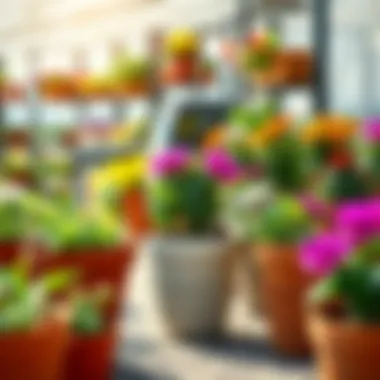
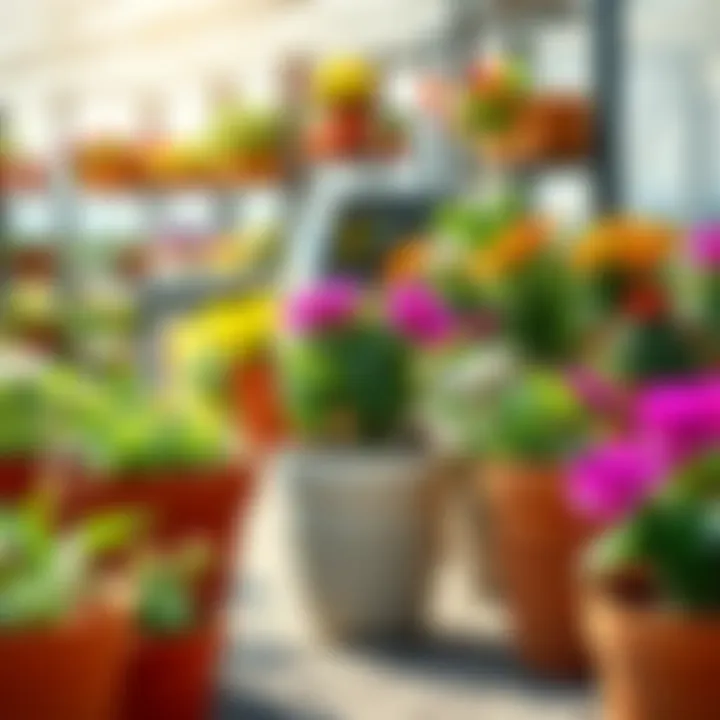
Material Considerations
The material of a pot can significantly impact plant health, offering a range of benefits and drawbacks. Plastic pots are lightweight and often more affordable than ceramic or terracotta alternatives. However, they may not be as breathable, which can lead to overheating or root issues if placed in direct sunlight. Containers made from recycled materials are gaining popularity and offer an eco-friendly choice without compromising on quality. When considering options, think about where you'll put the pots and how materials respond to environmental changes. Are you expecting long summers, or are cooler months ahead? Your choice of material should align with these eventualities.
In summary, understanding plant needs, ensuring good drainage, and choosing the right materials play a crucial role in the longevity and health of your plants. Select flower pots that match these criteria, and you'll set yourself up for gardening success.
Local Garden Centers
Local garden centers are a treasure trove for both new and seasoned gardeners alike. They not only offer a wide variety of plastic flower pots, but they also provide an experience tailored to the local climate and plant needs. Buying locally allows gardeners to gather more than just pots; it offers access to knowledgeable staff, unique plant varieties, and the possibility of connecting with the gardening community. This section dives into the benefits of local purchasing and how to identify reliable centers that can fit your gardening needs well.
Advantages of Local Purchasing
Purchasing from local garden centers comes with a multitude of benefits:
- Personalized Advice: Local centers often employ staff who are passionate about gardening. Their expertise can guide you in selecting the right pots tailored to your specific plants and growing conditions. This kind of face-to-face interaction is invaluable, especially for novices who might have questions about plant care.
- Support for Local Economy: When you buy from local businesses, you are supporting your community’s economy. Money spent at local shops often stays within the community, promoting local jobs and reducing the carbon footprint associated with shipping goods across the country or the globe.
- Diverse Selections: Local nurseries tend to carry seasonal plants and pots that are well-suited for local growing conditions. This can mean access to hard-to-find varieties or specially designed pots that are optimal for your environment.
- Immediate Gratification: Unlike online shopping, local garden centers allow you to instantly get what you need without waiting for shipping. This is especially important for those with time-sensitive gardening projects.
- Community Engagement: Buying locally often means entering a community of gardeners. These centers frequently hold workshops, events, or plant swap days that can broaden your gardening knowledge and foster friendships.
In short, local garden centers embody a community’s gardening spirit while providing practical benefits that extend beyond just purchasing pots.
Identifying Reliable Centers
Finding a trustworthy garden center can sometimes feel like searching for a needle in a haystack. Here are a few tips to help you identify reliable options:
- Reputation and Reviews: Start with online reviews or ask around in local gardening groups. Websites like Yelp or gardening subreddits can provide insights into others' experiences with specific centers.
- Facility Condition: A reliable garden center will maintain a clean and organized space. Observe plants—healthy plants indicate good care and attention from the staff.
- Product Variety: A well-stocked garden center should offer a range of flower pots, including different sizes and colors. Variety suggests that the center caters to diverse gardening needs.
- Staff Knowledgeability: When visiting, engage with staff by asking questions. A knowledgeable staff can enlighten you about the specific needs of plants and the benefits of various pot types. If they can provide thoughtful responses, it’s a good sign.
- Support for Local Growers: Check if the center promotes local growers or offers locally sourced products. This generally indicates a commitment to the community and eco-friendly practices.
Remember, taking the time to find a reliable local garden center can enhance your gardening journey significantly, and foster many fruitful experiences.
Retail Chains and Home Improvement Stores
When it comes to finding the right plastic flower pots, retail chains and home improvement stores stand out as vital resources. Not only do these establishments offer a wide selection of pots suited for various plants, but they also serve as convenient one-stop shops for all gardening needs. Shoppers can easily browse across vast aisles stocked with everything from soil to fertilizers and tools, creating an efficient shopping experience.
The significance of these retail venues cannot be underestimated. They often provide competitive pricing due to their scale, which can be an alluring factor for both amateur and experienced gardening enthusiasts. Furthermore, many chains have seasonal promotions and clearance sales, allowing savvy buyers to snag quality pots at discounted prices. The convenience of in-person shopping is another plus, as you can visually inspect products to ensure they meet your specific requirements. This tactile aspect allows you to gauge the quality of materials and sizes before purchasing, whereas buying online lacks this advantage.
Major Retail Options
Among chains, a few names come to mind due to their extensive gardening supplies and reasonable prices. Stores like Home Depot and Lowe's operate nationwide, catering to both urban and suburban audiences. These retailers usually stock various brands and styles of plastic pots, including self-watering and lightweight options designed for ease of use. They often have knowledgeable staff who can assist customers in selecting the right pots based on plant needs and environmental factors.
Additionally, Walmart offers a surprising depth of variety in gardening supplies. The prices are often very competitive, sometimes undercutting other retailers. Not to forget Target, which has increasingly expanded its own gardening section, focusing not just on functionality but also on aesthetics. Whether you're looking for pots to beautify your balcony or durable options for your garden, these stores are among the best options.
Comparing Prices and Offers
Price comparison is a critical element when shopping for plastic flower pots. While it may be tempting to fall for eye-catching sales, it’s essential to do a little homework first. Many retail chains offer price matching, so if you find a pot cheaper at a competing store, it can be beneficial to inquire about this policy. This further ensures that you get the best deal possible while shopping.
Create a simple checklist to compare prices:
- Identify the size and type of pot you need.
- List down different locations to check prices, including local growers and major chains.
- Be mindful of additional costs, such as taxes and potential shipping if buying online.
- Look out for bundle deals that may offer better value, especially those tied to seasonal gardening needs.
A good approach is to visit the stores physically when possível. Observing the pots, checking for durability, and sometimes even snagging a clearance find can be more rewarding than solely relying on online research. Ultimately, thoughtful price comparison can translate to substantial savings, allowing you to invest more into the plants themselves.
Online Marketplaces
In today's digital age, online marketplaces have become a cornerstone for gardeners seeking plastic flower pots. These platforms not only offer a vast selection but also provide the convenience of browsing from home, making them an attractive option for busy people and enthusiasts alike. The benefits of purchasing through online marketplaces are manifold: from an array of choices spanning various price points to the ability to read customer reviews before making a purchase. This section will delve into the nuances of evaluating online vendors and spotlight specific platforms where you can find quality pots to meet your gardening needs.
Evaluating Online Vendors
When it comes to online shopping, ensuring you buy from a reputable vendor is vital. Here are some key factors to assess:
- Feedback and Ratings: Check customer feedback, as this can give you valuable insights about the quality and service provided by the vendor. A seller with a high rating is typically a safer bet than one without reviews.
- Return Policies: Understanding return policies can save you a headache later. Look for vendors that offer a clear and fair return policy in case the product does not meet your expectations.
- Shipping Costs: Sometimes, the listed price might seem fair until you add the shipping costs. Ensure you look at the total cost before clicking buy.
- Communication: A responsive vendor can make transactions smoother. If you have questions, see how quickly they respond.
Marketplace Platforms
There are several popular platforms known for their varied offerings, and each has its unique attributes that cater to the diverse needs of gardeners:
Amazon
Amazon stands out with its extensive inventory and user-friendly interface. This platform offers countless options for plastic flower pots, ensuring you find something that fits your specific needs. One of Amazon's key characteristics is its customer reviews; potential buyers can read about past customers' experiences, helping them make informed choices. A unique feature is Amazon Prime, which provides free shipping benefits for members, making it a cost-effective choice for frequent buyers. However, the sheer volume of options can at times be overwhelming, and not all pots may meet quality expectations, so careful selection is necessary.
Etsy
Etsy is the go-to platform for those looking for unique, handcrafted flower pots. The charm of Etsy lies in its support of small businesses and artisans. This marketplace prioritizes individuality, allowing you to find pots that are one-of-a-kind, often with artistic flair. Its unique feature includes direct communication with sellers, so you can ask questions about specific designs or materials. However, be mindful that prices can be higher than mass-produced items, reflecting the craftsmanship involved. Always check seller ratings to ensure you're purchasing from someone reliable.
Walmart
Walmart's online presence offers a blend of affordability and convenience. This platform often features competitive prices on plastic flower pots, catering to budget-conscious shoppers. Its key advantage is the option for in-store pickup, which allows you to make your purchase online and collect it at a nearby store, saving on shipping costs. Products tend to be widely accessible, making it easy to find popular brands. Though Walmart is generally known for its low prices, the challenge can be in distinguishing the quality of products, so reading reviews and specifications is essential.
Specialty Gardening Websites
In today's digital world, specialty gardening websites have carved out a niche that significantly benefits both amateur gardeners and seasoned enthusiasts. These online platforms go beyond mere catalogs, offering a wealth of information and options tailored specifically to horticultural needs. The convenience of browsing from home, combined with access to a diverse range of products, makes these websites a formidable choice in sourcing plastic flower pots.
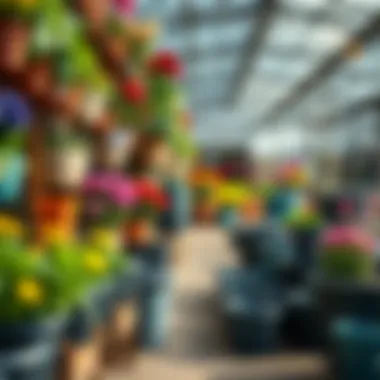
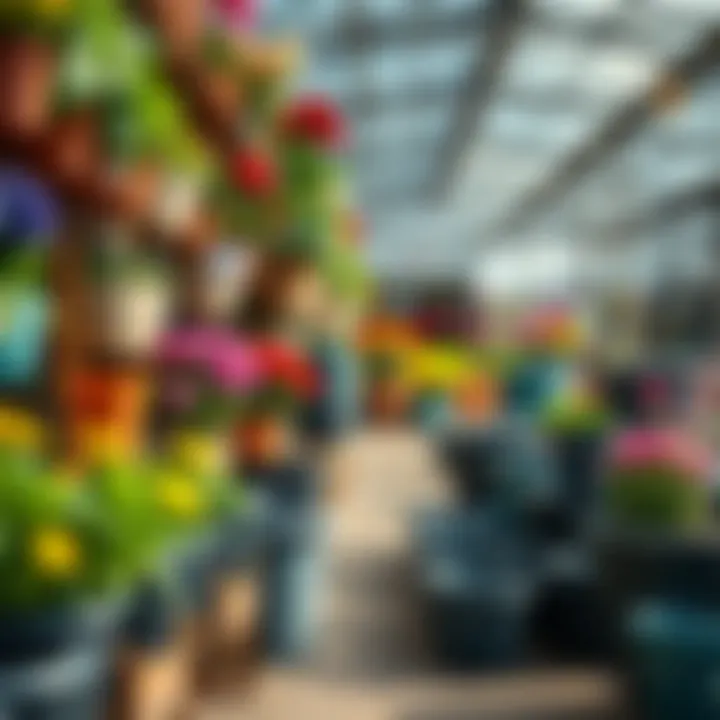
Niche Vendors
Niche vendors cater to specific gardening aspects, providing products that larger retailers may overlook. For instance, websites like Gardener's Supply Company focus on unique designs and eco-friendly materials, which resonate with eco-conscious gardeners looking to make a responsible choice. When selecting where to buy pots, consider the following advantages of niche vendors:
- Specialized Knowledge: Their expertise often leads to more informed recommendations regarding plant pot compatibility and care.
- Unique Product Range: Niche vendors frequently offer styles and sizes that cater to specific gardening goals, such as urban gardening or native plant cultivation.
- Quality Over Quantity: Smaller vendors often prioritize quality in their offerings, ensuring durability and aesthetic appeal.
These elements make niche vendors not just a shopping destination, but also a learning hub for gardeners looking to expand their knowledge.
Direct Manufacturer Sales
Buying directly from manufacturers can streamline the purchasing process, allowing you direct access to their produce at potentially lower prices. This route eliminates middlemen, which often results in better pricing and options. Companies like Greenhouse Megastore or Plastico, known for their reliable plastic pots, often have extensive selections and may even offer bulk purchasing options for gardening clubs or community projects.
When considering direct sales, keep in mind the following:
- Updated Product Lines: Manufacturers often showcase their latest innovations which may not yet be available through third-party sellers.
- Customized Orders: Some manufacturers provide custom solutions tailored to specific gardening needs, whether for professional landscaping or personal use.
- Improved Customer Service: Dealing directly with makers usually leads to a more personalized customer service experience, making it easier to resolve issues regarding product defects or special inquiries.
"Choosing the right source for your plastic flower pots can mean the difference between a flourishing garden and a lackluster display."
Social Media Marketplaces
The rise of social media has transformed countless aspects of life, including how we shop. In the realm of gardening, social media marketplaces serve as an increasingly important avenue for purchasing plastic flower pots. They offer not just a platform for transactions, but also a community where gardeners can share tips, exchanges ideas, and even create unique connections with fellow enthusiasts. This section dives into the benefits of shopping for flower pots via social media and stresses the considerations that come with it.
Buying Through Local Groups
One significant boon of social media marketplaces is the ability to tap into local gardening groups. Facebook is a prime example, with myriad groups dedicated to local flora enthusiasts. These forums allow members to buy and sell gardening supplies, including plastic flower pots, directly from each other.
- Community Trust: Any seasoned gardener will tell you that buying from someone you know or whose reputation is established within your community often feels more secure. Recommendations and reviews from group members can enhance confidence in your purchase.
- Local Pickup: Meeting locally for pickup not only saves on shipping costs but also allows you to inspect the pots firsthand. After all, it’s a different ball game to see if a pot meets your needs when it's in your hands.
- Supporting Local: Purchasing pots through these local channels boosts your community’s economy as well. You lighten the load on bigger retailers while encouraging your neighbors to thrive.
Use of Marketplace Features
Social media platforms often come equipped with various features designed to facilitate smooth transactions. Understanding how to navigate these can significantly improve your experience when searching for plastic flower pots.
- Search Filters: Utilize search features to hone in on what you need. Keywords like “plastic flower pots” or “gardening supplies” paired with your local area can yield fifteen varieties of pots right down the street.
- Marketplace Listings: Platforms like Facebook have a dedicated marketplace that lists items in your area. Listings can include pictures, prices, and seller information—often, they come from fellow gardeners who want to declutter.
- Engagement Options: Most platforms allow you to ask questions directly in the comments or via private messages. This transparency can help clarify any concerns about the pot's condition or the seller's reliability before purchasing.
By leveraging social media's advantageous features, gardeners can make informed decisions and foster a supportive community atmosphere that enriches their gardening experience.
Shopping through local groups and utilizing marketplace features opens up a whole new avenue for sourcing quality gardening supplies while building stronger community ties.
With the right approach, social media marketplaces can definitely be more than just another buying option; they can transform how you garden and connect with your surroundings.
For more insights on local gardening, check out sources like Wikipedia Gardening and relevant discussions on Reddit Gardening.
Take each opportunity to learn and grow, as social media can be a garden in itself for sharing knowledge.
Second-Hand Options
Exploring second-hand options for buying plastic flower pots can open a treasure trove of benefits that often go overlooked. Not only can this choice save a gardener a pretty penny, but it also plays into sustainable practices, which is always a plus for those who are environmentally conscious. In a world increasingly focused on reuse and recycling, purchasing used pots aligns with the movement toward reducing waste.
Many shoppers might dismiss second-hand as lesser or inferior in quality, but when scoutin' for used pots, there are some hidden gems to find. It's worth noting that second-hand pots often come with unique charm and character, giving gardens a personalized touch—like that rustic patina that can tell stories from past blooms.
Thrift Stores and Flea Markets
Thrift stores and flea markets can be a goldmine for folks in the market for plastic flower pots. These venues often feature an array of pots in various sizes and styles, from the common to the quirky. The thrill of treasure hunting can be quite rewarding, as you never know what you'll stumble across.
- Variety of Selection: Most thrift stores bring in different donations daily, so there tends to be a changing inventory. One day might yield classic terracotta pots, while another could offer colorful plastic options that suit specific décor needs.
- Affordability: Generally speaking, prices at thrift shops and flea markets are way easier on the wallet compared to retail outlets. This means that even on a shoestring budget, you can walk away with multiple pots without breaking the bank.
- Support Local Communities: Shopping second-hand often benefits local charities or small businesses. This ensures your funds go back into the community and encourages more sustainable buying habits.
Online Classifieds
Online classifieds haven’t shied away from modernity, thriving as a valuable resource for hot deals on plastic flower pots. They can connect gardeners directly with sellers; this often means buying locally or picking up pots that are gently used and still perfectly functional.
Craigslist
Looking at Craigslist, one might discover a surprisingly vast selection of pots listed under gardening or household categories. The distinctive quality of Craigslist is its localized service, connecting buyers with sellers in their region.
- Local Focus: This means you can save on shipping costs and often arrange for an easy pick-up. In many cases, meeting the seller allows for some bargaining, potentially lowering the price further.
- Community Connection: Craigslist fosters a sense of community. Folks list various sizes of pots that they don’t need anymore, and it creates a space for local gardeners to share their extra items. However, one must be cautious—always check listings carefully and communicate directly with the seller to avoid scams.
Facebook Marketplace
Jumping onto the Facebook Marketplace, one can see the dynamic nature of this platform when it comes to buying used items, including plastic flower pots. The built-in social element of being able to see a seller's profile adds a layer of trust.
- Instant Access: Listings update in real-time, so if you have a keen eye, you'll be among the first to snag a quality pot. The marketplace also allows direct messaging, facilitating easy communication with sellers.
- Diverse Listings: From novice sellers cleaning out their garage to more seasoned gardeners thinning out their collections, there’s a great range of options available, often accompanied by images that give a clear idea of the product.
Factors to Consider When Purchasing
When it comes to buying plastic flower pots, several crucial factors can dictate the success of your gardening endeavors. Every gardener, whether a novice or a seasoned expert, benefits from understanding these elements, as they can significantly impact both plant growth and gardening satisfaction. Here, we’ll delve into three primary factors: quality assessment, price comparison strategies, and shipping and handling considerations.
Quality Assessment
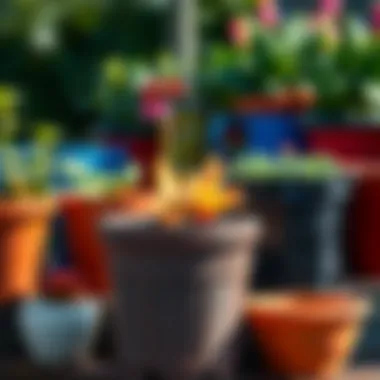
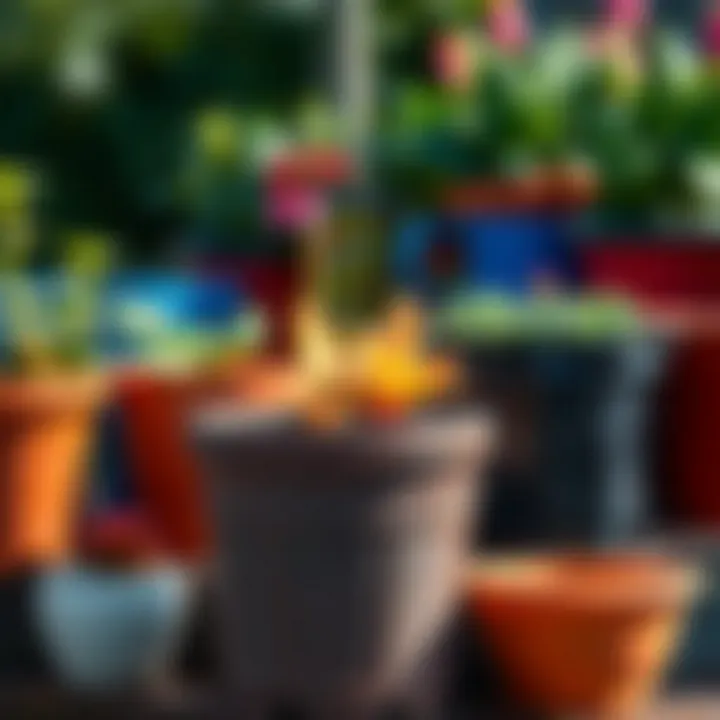
Quality should be at the forefront of your mind when purchasing plastic flower pots. Not all pots are created equal, and some might be more durable than others. It's essential to look for pots that are UV resistant, particularly if they're going to spend a lot of time in the sun. This can prevent fading and cracking, ensuring the longevity of your investment.
- Material Type: Pots made from high-density polyethylene (HDPE) tend to last longer than those made from lower-grade plastics.
- Thickness: A thicker pot often indicates better durability. Lightweight pots, while easy to handle, might not withstand the elements as effectively as heavier options.
- Reputation of Manufacturer: Research brands and suppliers to find those that are known for quality. It might be worthwhile to peruse customer reviews on gardening forums or specific product pages.
"Purchasing a pot that won’t break or crumble under pressure saves both time and money in the long run."
Price Comparison Strategies
In today’s marketplace, price variation can be staggering. Therefore, developing effective price comparison strategies is essential for budget-conscious gardeners. Here are some savvy tips:
- Online Price Tools: Use comparison websites to get an overview of prices across multiple platforms. This will help you avoid overpaying.
- Deals and Discounts: Keep an eye out for seasonal sales, especially towards the end of planting seasons or holidays. Loyalty programs at local garden centers can also provide discounts.
- Local vs. Online: Don’t overlook local garden centers when comparing prices to online retailers. While online options might seem cheaper at first glance, remember to account for shipping costs that can add up. Buying locally could save you some bucks and offer immediate access to your pots.
Shipping and Handling Considerations
Shipping and handling can often be the difference between a good buy and a bad deal. Understanding these factors can assist you in making an informed purchasing decision.
- Shipping Costs: Examine the seller's shipping policy. Some might advertise low prices on pots but have exorbitant shipping fees. Be wary of this hidden cost.
- Handling Time: Check how long the seller estimates it will take to process your order. If you're in a hurry and need pots for a specific planting schedule, waiting too long might not be an option.
- Package Integrity: Ensure the seller takes care in packaging the pots; damaged items can waste your time and money. Look for sellers with a good track record of proper handling.
In summary, being aware of these key factors—quality, price, and shipping—can equip you with the knowledge needed to make savvy purchasing decisions. A little diligence can ensure you find plastic flower pots that meet both your gardening needs and your budget.
Eco-Friendly Alternatives
Engaging in gardening is not just about nurturing plants; it’s also a responsibility toward the environment. The rising awareness regarding plastic waste has prompted many gardeners to seek eco-friendly alternatives when it comes to flower pots. Shifting toward greener options is crucial as it aligns with the growing trend of sustainable living. By choosing eco-friendly pots, gardeners can reduce their carbon footprint and practice a more environmentally conscious form of gardening.
Biodegradable Pots
Biodegradable pots are made from organic materials that decompose over time. One popular choice is plant-based plastics, which often include biopolymers derived from corn starch or sugarcane. These pots can be planted directly into the ground alongside the plant, allowing them to break down and enrich the soil. This not only eliminates the need for plastic waste but also supports the plant’s growth by providing additional nutrients.
The use of biodegradable pots has surged as more gardeners recognize their dual benefit—serving both the plants and the planet.
When selecting biodegradable pots, it's essential to check for certifications that guarantee they meet compostability standards. Some key benefits include:
- Reduced Waste: As they've been designed to break down, these pots won’t linger in landfills.
- Enhanced Soil: They contribute organic material that may improve soil quality over time.
- Versatility: Available in various sizes and designs, making them suitable for different plant types.
However, some considerations need to be made:
- They generally require proper conditions to decompose effectively. You should use them in outdoor settings with sufficient moisture.
- Depending on the brand, their durability may be less than traditional plastic pots. Therefore, short-term plant use is advisable.
Recycled Material Pots
Another noteworthy eco-friendly option is pots made from recycled materials. These pots are produced from post-consumer plastics, diverting waste from landfills and giving it a second life. They include everything from HDPE (High Density Polyethylene) to PET (Polyethylene Terephthalate) materials. By using recycled materials, you're not only saving energy but also reducing the demand for new plastic production.
The advantages of using recycled material pots speak for themselves:
- Sustainability: They utilize existing plastic waste, thus lowering the environmental impact.
- Affordability: Often more cost-effective than virgin plastic pots.
- Variety: Many manufacturers are now offering innovative designs that mimic traditional aesthetics, combining style with sustainability.
Though there are certainly upsides, be mindful of the following:
- Recycled pots may not have the same level of robustness as regular plastic pots. Check the reviews before purchase to ensure quality.
- Not all recycled pots are created equal; it’s wise to seek reputable brands to avoid those that might still contribute to environmental issues.
In summary, turning to eco-friendly alternatives such as biodegradable pots and those made from recycled materials is an effective strategy for environmentally-responsible gardening. Not only do they benefit your plants, but they also support sustainability efforts that are critical in today's ecological landscape.
Care and Maintenance of Plastic Flower Pots
When it comes to nurturing your plants, the material holding the soil and roots plays a significant role. Plastic flower pots, while practical and lightweight, require specific care and maintenance to ensure their longevity and efficiency. Understanding how to optimally clean and store these pots can significantly affect your gardening success. By taking proper care of your plastic pots, you can prevent issues such as mold, bacteria growth, and even root diseases from affecting your plants.
Cleaning Techniques
Cleaning plastic flower pots is not just about keeping them looking good; it’s crucial for maintaining plant health. Over time, leftover soil, algae, and mineral deposits can build up, potentially hindering water drainage and root health. Here’s how you can effectively clean your pots:
- Remove Debris: First, get rid of any leftover soil or organic matter. You can use a soft brush or cloth to scrub off stubborn bits.
- Soaking Solution: Prepare a soaking solution of mild detergent and warm water. Allow the pots to soak for about 15-30 minutes, especially if they have stubborn stains or mineral deposits.
- Scrubbing: After soaking, use a non-abrasive scrubbing pad to clean the inside and outside of the pot. Pay attention to any grooves or designs where dirt might collect.
- Rinsing Thoroughly: Rinse the pots under clean water to remove any soap residue. Ingoring this step can result in toxic build-up, affecting plant growth.
- Disinfecting (If Necessary): If you've noticed any mold or disease on previous plants, consider using a diluted bleach solution (one part bleach to ten parts water) to disinfect. Let it sit for a few minutes before rinsing thoroughly again.
These cleaning steps should be carried out regularly, especially between plantings, to minimize the risk of diseases and pests.
Storage Recommendations
Proper storage of your plastic flower pots can extend their life and usability, making it easier for you to jump into the next gardening season without a hitch. Here are some tips for storing those pots:
- Dry Storage: Make sure your pots are completely dry before storing to avoid mold growth. Just like human habitats, your pots need a little breathing room.
- Stacking: If you have multiple pots, stack them neatly, but ensure that larger pots are at the bottom to bear the weight without damaging smaller ones. Use separation materials, like cardboard, between them if there's a risk of scratching.
- Avoid Sunlight: Store in a shaded area to prevent them from becoming brittle and faded from the sun's harsh rays. A shed or garage works well, just give them a little fresh air occasionally.
- Monitor Pest Presence: Make a point to check your storage area for pests and treat accordingly. Uninvited guests can wreak havoc on your gardening supplies!
By giving attention to the cleaning and storage of plastic flower pots, gardeners can ensure they not only last long but support thriving plants in the process.
"A clean pot is sometimes just as important as the plant it holds."
Finale and Recommendations
In wrapping up our exploration of where to buy plastic flower pots, it’s clear that a well-informed decision can significantly enhance your gardening endeavors. Choosing the right pots goes beyond mere aesthetics; it plays a crucial role in the health and growth of your plants. With numerous buying options available—local garden centers, retail chains, online marketplaces, specialty websites, and even second-hand avenues—gardeners are presented with a wealth of choices that cater to varying needs and preferences.
When considering a purchase, remember these key elements:
- Quality Over Price: While it’s tempting to opt for cheaper pots, investing in higher-quality plastic pots can prevent issues down the line, such as cracking or warping, especially under fluctuating weather conditions.
- Evaluate Local and Online Options: Each buying venue comes with its unique benefits. Local centers often allow for immediate purchase and hands-on inspection, while online platforms provide convenience and potentially wider selections.
- Consider Eco-Friendly Choices: The gardening sector is increasingly leaning towards sustainability. Biodegradable or recycled pots may offer a dual benefit of reducing environmental impact while meeting your planting needs.
- Don’t Overlook Maintenance: Proper care of your pots, regardless of where they are sourced, is essential. Cleaning and storing them correctly can extend their lifespan and maintain their appearance.
Above all, take the time to align your choices with the demands of your plants and personal garden philosophy. For those who want to delve deeper into specialized supplies or gain insights from fellow enthusiasts, platforms like Reddit can be goldmines of information. Websites such as Wikipedia, Britannica, and even local agricultural extension services provide valuable resources to deepen your understanding of gardening and pot selection.







